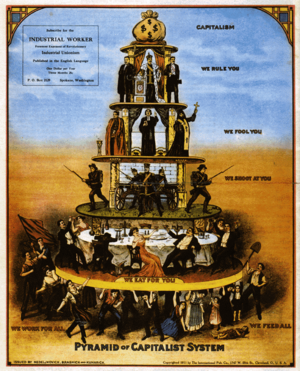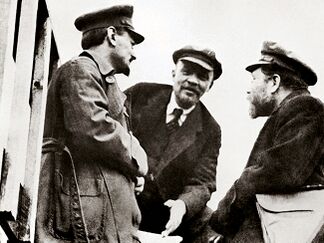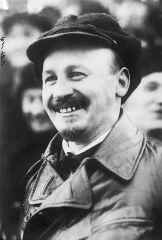Class

Social class refers to the position or rank of different groups within society, corresponding to their socioeconomic position. Contemporary Marxists usually define class as being a function of one's position in relation to social labour and the means of production. Class can be said to form part of the relations of production of a given society, existing between the material mode of production and the superstructure. Marxists consider workers and capitalists to be the main classes of modern capitalist society.
Concept
Marx did not provide a simple definition of class. He used the term loosely, often as a substitute for "faction", "group", or "layer". In one text Marx even uses the terms "ruling class" and "ruling faction" interchangeably.[1] In the Manifesto he speaks of class as "various orders", "social ranks", and even the broad category of "oppressor and oppressed".[2] But Marx's use of the term did imply a certain relationship between specific classes and society as a whole. For example, in Capital vol.3 Marx defines the "three big classes of modern society" in terms of ownership: the owners of labour power, the owners of capital, and land-owners. Unfortunately, Marx's analysis of why these three groups constituted distinct classes was never completed before his death.[3] Definitions of class based on ownership would predominate in the 20th century.
Marx's concept of class was deeply tied to his theory of history and human society. In a 1852 letter, Marx wrote:
Now as for myself, I do not claim to have discovered either the existence of classes in modern society or the struggle between them. Long before me, bourgeois historians had described the historical development of this struggle between the classes, as had bourgeois economists their economic anatomy. My own contribution was 1. to show that the existence of classes is merely bound up with certain historical phases in the development of production; 2. that the class struggle necessarily leads to the dictatorship of the proletariat; 3. that this dictatorship itself constitutes no more than a transition to the abolition of all classes and to a classless society.[4]
In Wage Labour and Capital, Marx describes the growth of social relations, and thus classes, out of material production:
"In the process of production, human beings work not only upon nature, but also upon one another. They produce only by working together in a specified manner and reciprocally exchanging their activities. In order to produce, they enter into definite connections and relations to one another, and only within these social connections and relations does their influence upon nature operate – i.e., does production take place."[5]
In Capital vol.3, Marx wrote:
"The specific economic form, in which unpaid surplus-labour is pumped out of direct producers, determines the relationship of rulers and ruled, as it grows directly out of production itself and, in turn, reacts upon it as a determining element. Upon this, however, is founded the entire formation of the economic community which grows up out of the production relations themselves, thereby simultaneously its specific political form. It is always the direct relationship of the owners of the conditions of production to the direct producers — a relation always naturally corresponding to a definite stage in the development of the methods of labour and thereby its social productivity — which reveals the innermost secret, the hidden basis of the entire social structure and with it the political form of the relation of sovereignty and dependence, in short, the corresponding specific form of the state."[6]
Interpretations of Marx's concept
Controversy
As seen above, Marx's often imprecise use of the term "class" has led to conflicting interpretations. These competing theories of "class" in Marxist terminology have resulted in significant differences in opinion about the exact meaning of "socialism", "communism, and "classless society" which remain relevant in contemporary Marxist debates.
Lenin's definition
Lenin's definition provided a direct yet nuanced concept of class incorporating a mixture of ownership, social roles, and ability to appropriate surplus labor. Lenin wrote:
"Classes are large groups of people differing from each other by the place they occupy in a historically determined system of social production, by their relation (in most cases fixed and formulated in law) to the means of production, by their role in the social organisation of labour, and, consequently, by the dimensions of the share of social wealth of which they dispose and the mode of acquiring it. Classes are groups of people one of which can appropriate the labour of another owing to the different places they occupy in a definite system of social economy."[7]
Trotsky's definition
In The Revolution Betrayed, Trotsky offered the following definition of "class":
"Classes are characterized by their position in the social system of economy, and primarily by their relation to the means of production. In civilized societies, property relations are validated by laws."[8]
Trotsky resisted the idea that a bureaucracy, such as that which existed in the Soviet Union, could be a class in the Marxist sense of the word.
"The class has an exceptionally important and, moreover, a scientifically restricted meaning to a Marxist. A class is defined not by its participation in the distribution of the national income alone, but by its independent role in the general structure of the economy and by its independent roots in the economic foundation of society. Each class (the feudal nobility, the peasantry, the petty bourgeoisie, the capitalist bourgeoisie and the proletariat) works out its own special forms of property. The bureaucracy lacks all these social traits. It has no independent position in the process of production and distribution. It has no independent property roots."[9]
Trotsky further argued that the Soviet bureaucracy was not a class, but a "caste". It existed not by exploitation of the working class but by "parasitism".
"Nevertheless, the privileges of the bureaucracy by themselves do not change the bases of the Soviet society, because the bureaucracy derives its privileges not from any special property relations peculiar to it as a “class,” but from those property relations that have been created by the October Revolution and that are fundamentally adequate for the dictatorship of the proletariat. To put it plainly, insofar as the bureaucracy robs the people (and this is done in various ways by every bureaucracy), we have to deal not with class exploitation, in the scientific sense of the word, but with social parasitism, although on a very large scale."[10]
Bukharin's definition
An extended examination of class is presented in Nikolai Bukharin's work on historical materialism. In this account, Bukharin conceptualizes class relationships as being a relationship between persons but expressed in things. Bukharin divides class into two basic categories in human production - those who command and those who execute.
"A social class - we have seen - is the aggregate of persons playing the same part in production, standing in the same relation toward other persons in the production process, these relations being also expressed in things (instruments of labor).
[...]
"why are the persons who are united in a class reproduced as a class? How comes it that - let us say - in capitalist society certain types of income exist? What is the cause for the stability of these "types of income"? The mere putting of these questions shows the true statement of affairs. This stability depends on the relation to the means of production, which, in turn, express the relation between men in the process of production.
[...]
"The basic classes of a given social form (classes in the proper sense of the word) are two in number: on the one hand, the class which commands, monopolizing the instruments of production; on' the other hand, the executing class, with no means of production, which works for the former. The specific form of this relation of economic exploitation and servitude determines the form of the, given class society." [11]
Bukharin's account also includes a short discussion of class and caste:
"A class, as we have seen, is a category of persons united by a common role in the production process, a totality in which each member has about the same relative position with regard to the other functions in the production process. A social caste, on the other hand, is a group of persons united by their common position in the juristic or legal order of society. Landlords are a class; the nobility are a caste; the great landlords are defined by a common production type, not so the nobility." [12]
G.A. Cohen's definition
In his work Marx's Theory of History: A Defence, Cohen advances a "structural definition of class. Cohen wrote:
"It defines the class with reference to the position of its members in the economic structure, their effective rights and duties within it. A person's class is established by nothing but his objective place in the network of ownership relations, however difficult it may be to identify such places neatly. His consciousness, culture, and politics do not enter the definition of his class position."[13]
It should be noticed that Cohen's definition of class, while relying upon the idea of ownership, defines ownership as "not a legal relationship but one of effective control."[14]
Wolff & Resnick's definition
Richard Wolff and Stephen Resnick advanced the concept of a "surplus labor notion of class", or a "class-qua-surplus" definition. In this theory, the concept of class is defined in terms of different means of "appropriation and distribution of surplus labor." Wolff and Resnick contrast their interpretation of the Marxist theory of class with competing definitions based on ownership and power.[15] Class, in these terms, in conceived of more as a process than a rigid category or rank within society.
"As we read Marx's work, class is one distinct process among the many that constitute life. The class process is that "in which unpaid surplus labor is pumped out of direct producers" (Marx 1967a: 3, 791)."
[...]
"Processes never exist alone; they do not occur by themselves. Rather, the concept of process is an analytical device to pinpoint the constituent aspects of relationships in society. Particular relationships are understood, defined as particular sets of processes."[16]
Wolff and Resnick, on the basis of their class-qua-surplus definition, reject entirely that countries like the former Soviet Union achieved communism or even a socialist transition to communism.[17]
References
- ↑ Ollman, Bertell. Marx's Use of "Class".
- ↑ Marx & Engels. The Communist Manifesto, 1848.
- ↑ Marx & Engels. Capital vol.3, ch.52.
- ↑ Marx, Karl. Letter to Joseph Weydemeyer, 1852.
- ↑ Marx, Karl. Wage Labour and Capital, ch.4, 1847.
- ↑ Marx & Engels. Capital vol.3, ch.47.
- ↑ Lenin, Vladimir. A Great Beginning, 1919.
- ↑ Trotsky, Leon. The Revolution Betrayed, ch.2, 1936.
- ↑ Trotsky, Leon. The Class Nature of the Soviet State, 1933.
- ↑ Trotsky, Leon. The Revolution Betrayed, ch.9, 1936.
- ↑ Bukharin, Nikolai. Historical Materialism - A System of Sociology, ch.8.
- ↑ Bukharin, Nikolai. Ibid.
- ↑ Cohen, G.A. Marx's Theory of History: A Defence, p73, 2000.
- ↑ Cohen, G.A. Ibid. p35, 2000.
- ↑ Wolff, Richard and Resnick, Stephen. Class Theory and History, p4.
- ↑ Wolff, Richard and Resnick, Stephen. New Departures in Marxist Theory, p92.
- ↑ Wolff & Resnick. Class Theory and History, p4.

